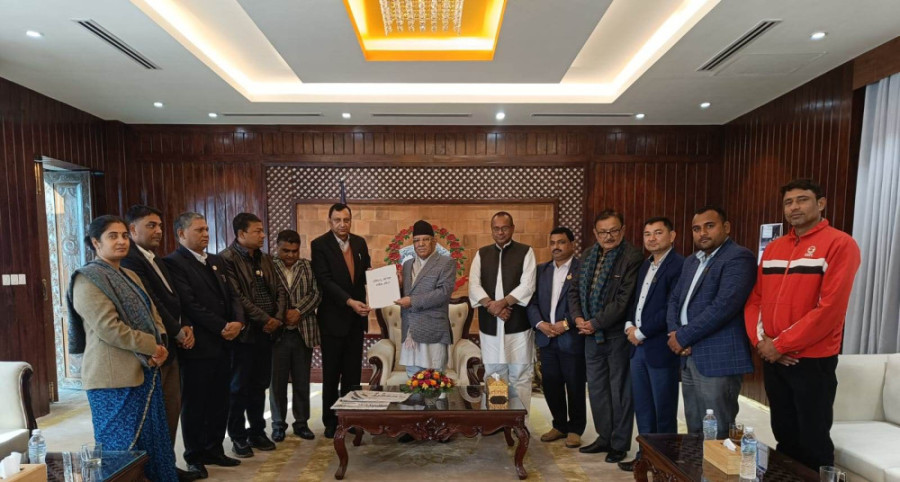National
Chief ministers meeting this month to devise strategies
Provinces have been pressing federal government to devolve their constitutional rights.
Post Report
While Prime Minister Pushpa Kamal Dahal continues to delay the devolution of constitutional authority to other layers of government, provincial chief ministers are planning to meet later this month to formulate strategies to pressure the federal government.
Starting last month, Madhesh Province is taking one step after another asking Kathmandu not to further delay the adjustment of the police force at the provincial level and promulgation of a federal civil service act. Other provinces too are joining forces with the Madhesh Province to assert their rights.
Despite repeated assurances, Dahal remains indifferent to addressing the concerns of the provinces. So the chief ministers of all seven provinces are holding a gathering on December 29 to decide their future course to assert their rights. “Our demands have remained the same for years. Provincial governments have failed to work properly because they are unable to exercise their constitutional authorities,” Shalikram Jamkattel, Bagmati province chief minister, told the Post. “We will discuss these issues during the meeting.” The Bagmati provincial government is set to host the meeting in Hetauda.
Schedule 6 of the Constitution of Nepal lists 21 exclusive authorities of the provincial governments. Maintaining law and order and having its own provincial police is the first authority on the list. Article 268(2) also states that each province will have its own police force. Clause 3 of the Article says matters relating to the operation, supervision and coordination of functions to be discharged by the Nepal Police and the provincial police shall be as provided for in the federal law
The federal parliament in 2019 endorsed the Police Personnel Adjustment Act and the Act to Govern the Operation, Supervision and Coordination of Nepal Police and Provincial Police Forces. Similarly, all the provinces have endorsed their respective provincial police laws to clear legal hurdles in overseeing their police forces. However, they cannot set up police forces unless the federal government adjusts the existing police force at the provincial level. This has to happen as per the Act endorsed by Parliament in 2019.
The Police Personnel Adjustment Act authorises the federal government to assign a deputy inspector general of Nepal Police to serve as provincial police chief. The federal government can transfer such police officers to other provinces or any department of Nepal Police in consultation with the concerned provincial governments.
However, in case of other personnel adjusted to provincial police forces, the relevant provincial official can transfer such personnel to any police unit in the province. Ignoring repeated demands of the provinces, successive federal governments have hesitated to implement the Police Personnel Adjustment Act.
Similarly, provincial governments also have not been able to recruit civil servants because Kathmandu is yet to promulgate a federal civil service law.
On November 9, a team of all-party representatives from Madhesh Province issued a 30-day ultimatum to Dahal to address their six-point demand, warning of a protest if Kathmandu took no urgent step to fully implement constitutional provisions. A team comprising all the internal affairs ministers from seven provinces met Dahal and Deputy Prime Minister and Minister for Home Affairs Narayan Kaji Shrestha in the last week of November and urged him to promptly heed their demands.
As no steps were taken within the deadline, a team of leaders led by Saroj Kumar Yadav again met Dahal on Sunday, demanding a timeline for implementing the constitutional rights of provinces. Madhesh Province deferred its protest after the prime minister sought a few weeks to address their demands. “We believe the prime minister will act as per the commitment,” said Jamkattel, a leader of the Maoist party led by Dahal.
The provincial leaders blame successive governments including Dahal for failing to abide by their commitments. While he is still indifferent to addressing the demand of the provinces, the prime minister in public has been reiterating that he is committed to strengthening federalism. “Promulgation of laws to implement federalism is my top priority. I am very serious about addressing these issues,” said Dahal speaking at a function organised by Kathmandu Metropolitan City on Friday.
According to a study conducted last year by the Legislation Management Committee of the National Assembly, only 111 laws among the 151 needed for implementing the 2015 constitution have so far been enacted. Still 40 Acts need either major amendments or replacement with new ones to bring them in sync with the constitution, according to the study.
Experts on federalism say it is unfortunate that the government of the CPN (Maoist Centre) which claims itself to be a true advocate of federalism is showing no interest in devolving constitutional authority to the provinces. National Assembly member Khim Lal Devkota, who also is an expert on federalism, said successive federal governments have cheated the provinces by not promulgating necessary laws even as the country has already marked the eighth anniversary of the federal constitution.
"I don't think the federal government will take the provinces seriously until the chief ministers start picketing outside the Singha Durbar gate. It is already late for them to take action."




 18.12°C Kathmandu
18.12°C Kathmandu













